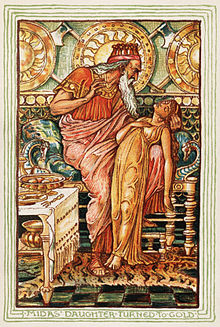Midas
Midas (Greek Μίδας, called Mita in Assyrian sources) was a king of Phrygia who ruled from 740 B.C. C. and 696 B.C. C, approx. According to Greek mythology, the monarch was cursed to turn everything he touched into gold. According to Aristotle, legend claimed that Midas starved to death due to the strange power of him, which was partly a curse. Likewise, his story holds that Midas and his father Gordias founded the city of Gordio, the capital of Phrygia, and tied the Gordian Knot, indicating that they both lived sometime in the 2nd millennium BC. C., long before the Trojan War. However, Homer does not mention Midas or his father Gordias, although he does mention other Phrygian kings such as Migdon and Otreus.
Reign
Married to a Greek woman, Midas was the first foreign king to send a gift to the sanctuary at Delphi. It was probably during his reign that Phrygia adopted the Greek alphabet.
The reign of Midas marks the greatest period of splendor for Phrygia, which expanded to the east, as far as the border with Urartu, occupying a large area of Asia Minor. He maintained commercial relations with Assyria and Urartu, reaching the king an extraordinary wealth, which caught the attention of the Greeks, who dedicated a space to him in mythology.
A contemporary of Tiglath-Pileser III, Shalmaneser V, and Sargon II, for many years he instigated uprisings of the principalities of Asia Minor against Assyria, supporting Hama, Karchemish, Tabal, Gurgum, Kummukhu and Meliddu, until he was finally attacked by Sargon II. Fearing the power of the Assyrian, Midas sent an embassy to him, declaring himself a vassal.
After conflicts with Sargon II, it suffered invasions from the Cimmerians, who destroyed the capital Gordio. According to tradition, Midas committed suicide and thus ended Phrygia's short period of hegemony.
The myth
In Greek mythology, Midas was king of Phrygia, and son of Gordias. He had a daughter named Zoe.
According to Greek mythology, for his hospitality with Silenus, Dionysus gave him the power to turn everything he touched into gold. Seeing that he could not eat the food that was transformed into that metal when he came into contact with him, he asked Dionysus to free him from his gift. He told him to wash himself in the Pactolo river. When he did, the river turned the color of gold.
Contenido relacionado
Gilgamesh
Excalibur
William Tell
Trojan war
Troy Horse


